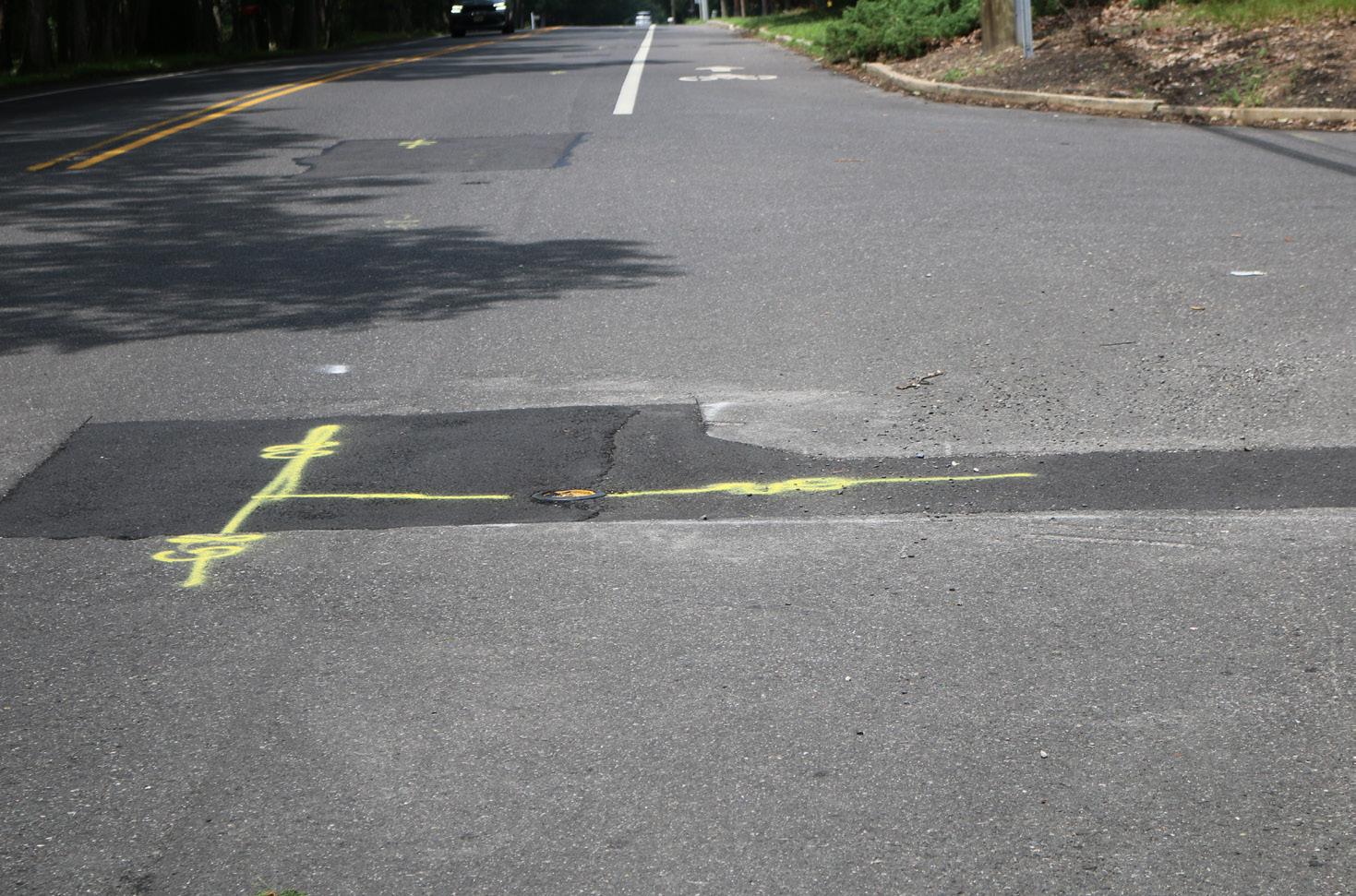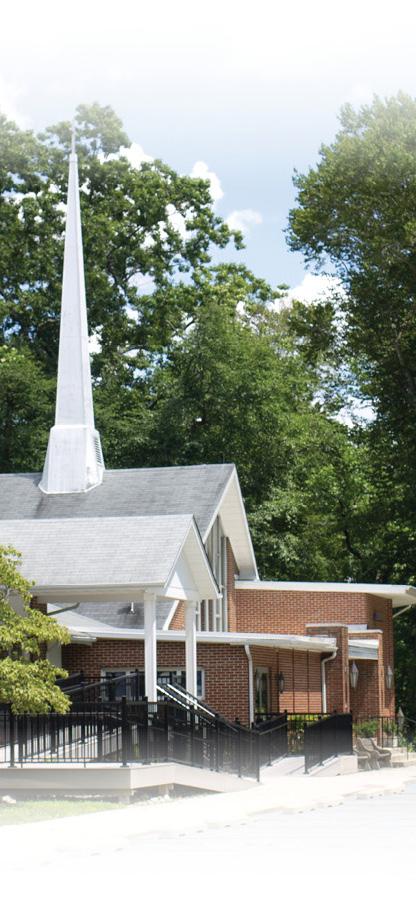Township Says It Has No Current Law That Would Allow It to Curtail Events, But FB Posts Indicate Owner Might
By Bill B onvie Staff Writer





BASS RIVER—When used in describing a particular setting, a “retreat” is defined by the Oxford Online Dictionary as “a quiet or secluded place in which one can rest and relax.”



But that is hardly how neighbors of “Tom’s Retreat,” the current name given to the walled compound located at 5847 Route 9 in Bass River Township, about a mile outside the Village of New Gretna, characterized it to the Bass River Board of Commissioners at its July 10 meeting. The residents took issue not only with the atmosphere of the property itself, but the disruptive impact they claim the activities there have had on everyone living in the vicinity.
According to a website for the Tom’s Retreat Veterans Foundation, a nonprofit located at that address, the foundation’s mission is “to generate awareness and show appreciation for one of America’s most unsung groups of patriots — Vietnam War veterans,” of whom its founder, Thomas Sherwood, is one.
By Bill B onvie Staff Writer















WATERFORD—Nearly two years ago on July 29, 2021, car-racing and hotrod enthusiasts residing in, around and even considerably beyond the Jersey Pine Barrens let out a huge collective sigh of




relief when, after months of hearings, the Waterford Township Joint Land Use Board unanimously rejected a proposal to turn the iconic, six-decade-old Atco Dragway into a storage site for distressed and disabled vehicles that were due to be auctioned off via the Internet.
Not only was the repeatedly revised plan regarded by its detractors as hazardous to the environmental health of an area that includes the Mullica River watershed, given the potential for fuel and other toxic fluids to leach into the ground, along with the distinct







See ATCO/ Page 8











The only kind of awareness that the purportedly paid events staged there on weekends seem to have engendered on the part of a number of nearby residents who showed up to air their complaints about them, however, was awareness of the volume of noise they generate, along with the excessive amount of traffic they are said to have created on the adjacent highway. And those disruptions, they told the commissioners, have totally destroyed the peace and tranquility they were seeking in having moved to this rural locale.
See RETREAT/ Page 10

After Having Been Spared Two Years Ago from Becoming a Storage Lot for Junk Cars, South Jersey’s Iconic 63-Year Old Dragway Is Suddenly and Inexplicably Closed Down, Leaving Area Racing Enthusiasts Bereft of a Venue Many Have Known Since Childhood
‘Tom’s Retreat,’ Rte. 9 Estate Intended to Benefit Veterans, Is Subject of Complaints from Noise- Bedeviled NeighborsPhoto By Ryan Hughes/CBS News Philadelphia






TABERNACLE—Are changes being made to a previously-presented, controversial Tabernacle Township Committee plan to construct a new town hall at 144 Carranza Road, without the full governing body’s consent or knowledge?



It is a prospect that was suggested as a possibility by Tabernacle Committeeman William J. Sprague, Jr., during a July 3 governing body meeting – and one that could conceivably have some merit to it considering this newspaper’s previous reporting that a trio of the township’s former mayors have critically questioned the plan, believing other options should be first explored, and that the township’s GOP chairman has also had at least some reservations about the plan as has been presented, too.
The plan for building a new town hall having not been mentioned at a township committee meeting since May 8 and a resident reportedly having come up to Sprague during the township’s Memorial Day Parade, informing the committeeman that “a lot of changes” to the original plan are reportedly underway, unbeknownst to him, was apparently enough for the committeeman to publicly question what is going on with it during the July 3 meeting, and to do so in an unprecedented fashion.
When Township Administrator and Clerk Maryalice Brown opened the floor for public comment, Sprague took to the floor first, “making this comment as a resident.”
“I have been in this job for six months and it has been an eye-opening experience,” he declared. “And I noticed some things that have come up and I really think they need attention.”
Sprague, temporarily foregoing his committeeperson hat, appeared to both confound and surprise some of the other officials in attendance on July 3, with Brown heard questioning whether Sprague was speaking as a resident or committeeman. Making this decision by Sprague to speak out even more unprecedented is that in Tabernacle, time is set aside for each committeeperson to provide their thoughts on topics affecting the municipality during
what is known as “committee comments.”















“We were supposed to get updates … on the new building and everything that was going on,” Sprague said. “Somebody came to me at the parade, and he said that I understand there has been a lot of changes with the building. I said, ‘What changes?’ He said, ‘We are not building a new building. We are knocking down the old building. And we don’t know where they are going to put the next building up at right now.’ That is what is out there right now. So, it needs to be corrected, and it was supposed to have been corrected with reports, and that has not happened.”
Sprague, however, would not get that sought-after correction from officials or his fellow committee colleagues, with the topic of the plans for town hall (as well as for the old town hall) not being addressed during the July 3 session, at least during the public portion of that meeting.

The plan for building a new town hall was last discussed during a May 8 committee meeting.



That is when Committeeman Noble McNaughton made a motion to “approve the footprint” for both the new town hall and separate Public Works facility to be built at 144 Carranza Road, which garnered unanimous committee support at the time.
Township Engineer Tom Leisse, who had been regularly providing updates on the plan up until that session, prior to McNaughton’s motion, reported that township officials met with Pinelands Commission officials and that the state agency’s initial feedback was “positive.”




“The initial comment was the site appeared very workable within their requirements,” Leisse maintained. “They just reminded us of a condition of septic dilution, which we are aware of, and we have a septic designer working on that portion of the site. They did give us notes on an initial drive. They did give us notes on a deed-restricted area, whereas before, we had possibly a walking track, and they have since indicated there can be no construction in the open area.
Other than that, they didn’t see anything in the site plan that would keep the project

Tabernacle Township Employee’s Visit to Business Over Flag Complaint
Gives Way to ‘Issue’ of Reportedly Unknown Firehouse Lot Arrangement
Governing Body Acts Retroactively to Charge Utility Monthly Rent Payments
 By D ouglas D. M elegari Staff Writer
By D ouglas D. M elegari Staff Writer
TABERNACLE—Amid an, at times, chaotic Tabernacle Township Committee meeting on July 3 in which a participant repeatedly alleged “maladministration,” Township Administrator and Clerk Maryalice Brown contended both the township committee and administration were previously unaware of private utility contractors, reportedly associated with South Jersey Gas, utilizing the Tabernacle firehouse’s gravel parking lot on Hawkins Road as a storage site, including for their vehicles, supplies, debris and equipment, as has evidently been done since the beginning of the year.
It was a claim that led to public disbelief, given the firehouse at Route 206 and Hawkins Road has not only been the site of township committee meetings since March, but is also in a prominent location in town with highway frontage, as well as serves as a polling location.

The township’s purported learning about what was indicated to have been a purportedly unknown arrangement of some sort between the utility contractors and township fire chief (with the township committee claiming it needed to provide authorization for use of the lot) came about as a result of another apparent mishap that forced Brown to offer a public explanation: a township official, on his own accord, having paid a recent visit to a local businessman’s place of business to inform him that his American flag was the subject of a complaint.
The business owner, as became apparent during the July 3 committee meeting, had


previously been approached by the utility contractors for use of his lot for $1,100 a month, but they ultimately decided to go with the firehouse lot, in which no guaranteed compensation arrangement reportedly had been established up until July.

“I told Maryalice that now that this is a big issue (the flag), now I am going to make sure I make other issues in our town, a priority in our town!” declared that business owner, Brian Serafine, owner of B&B Landscaping, Inc. on County Route 532, as well as a Hawkins Road resident, who was paid a visit by a township employee over his American flag.
But before Serafine could describe in detail his “concern about this construction yard in the township parking lot,” having only gotten a chance during public comment to offer details about the flag incident, he was cut short by Deputy Mayor Mark Hartman, invoking the township committee’s recently implemented, and highly-controversial two-minute public comment rule that was created at the behest of the deputy mayor.
Residents, however, attending the meeting, vocally protested their time being capped at two minutes throughout the proceedings, some ignoring the policy altogether and shouting out the points they came to make to their elected officials, with one individual making the point the committee members are “servants” to the citizenry.
Serafine ultimately was one of those individuals who made their concerns known by getting in his points throughout various
See LOT/ Page 8
Tabernacle Places Road Opening Moratorium on South Jersey Gas, Claiming Utility Hasn’t Addressed ‘Ruts’ Created on Oakshade Road Contractors Purportedly Associated with Utility Co. Installed Gas Mains Earlier in Year on Oakshade Road, Tearing Up Recently Repaved Stretch
By D ouglas D. M elegari Staff Writer
TABERNACLE—Citing an unwillingness to communicate with Tabernacle Township officials and rectify what has been described as “ruts” left behind where utility contractors associated with South Jersey Gas opened portions of Oakshade Road to install gas mains, the Tabernacle Township Committee has placed a temporary moratorium on all road openings associated with the gas company.
But numerous residents here are reportedly furious that the utility was allowed to open a portion of Oakshade Road that spans sections of both Shamong and Tabernacle townships after the section of road at issue was only repaved two-and-a-half and four years ago, respectively, after a 30-year wait.
The calamity in this neighborhood, this newspaper has learned, is the result, at least in part, of some apparent bureaucratic issues that have trickled out at recent committee meetings in these two towns.
Susan Onorato, township administrator for Shamong, when the issue of the road openings by South Jersey Gas on Oakshade Road was raised back in February, revealed that “they did so without the proper approval.” It was a claim she repeated again at a July 11 Shamong Township Committee meeting.
“They did all those road openings without our permission,” she maintained.

Additionally, during a Tabernacle committee meeting back in February, Tom Leisse, an engineer for Tabernacle Township, acknowledged that while Tabernacle has a “moratorium ordinance” that indicates the road needs to be repaired using infrared paving technology, it does “not specify a timeframe” in which that is supposed to be done.

Tabernacle Committeeman Noble McNaughton has since called on his colleagues to “toughen up that ordinance,” though no immediate action has been taken.


The condition of the road and purported lack of progress to have it repaired was one of four things that led Tabernacle Committeeman William J. Sprague, Jr., to make an unprecedented move at a July 3 Tabernacle committee meeting, and briefly forgo his committee title, speaking to the governing body as a “member of the public” during a public comment section.
“Those people have been forgotten about,” Sprague declared. “Every time that comes up, there is ‘no report,’ ‘no report.’ We

have to, as a board, be able to do something and get the gas company in there to fix it. I have an idea, but we have to get them to do something!”




Sprague’s decision to speak as a member of the public and light a fire under the very committee that he is part of seemed to shock Tabernacle officials, with Township Administrator and Clerk Maryalice Brown heard, apparently confounded, questioning whether Sprague was speaking as a member of the committee or public.
In Tabernacle, members of the committee are each allotted time to speak during “committee comments,” further indicating that Sprague wanted to put a sharp point on this issue, along with the three others (see separate story on one of them), by doing what he did.
Leisse, later in the July 3 meeting, described that a letter has been “transmitted” to South Jersey Gas advising them of a May 22 committee decision to place a road opening moratorium on all such work performed by the utility until it satisfactorily resolves the issue at hand, and that “all road opening applications have been rejected since then.”
“We are working on trying to get a response,” Leisse maintained. “If the committee has any suggestions to prompt them to get us a response on restoration … .”






That is when Sprague raised the issue of utility contractors, reportedly affiliated with the utility, using the township firehouse’s parking lot as a storage site (see separate story), before asserting that his idea is to send another letter that if “none of this is done, there is to be no more overnight storage.”

“We have to increase pressure,” maintained Sprague, believing that if the affiliated contractors are told that they can no longer use the site for off-site storage, it will present them with a huge cost burden in which the utility will have to come to the table.
McNaughton described that in making the road openings to install gas mains, the utility contractors patched them “using squares.” Initially, the square patch jobs were smooth, according to the committeeman, because the soil underneath “doesn’t immediately start to compact,” but that overtime, the “soft soil” started to “compact itself,” causing the asphalt to become “really bumpy.” There are compactors that can compact the soil for a
Tabernacle’s Prickett’s Mill Park Again Reportedly Targeted by Vandals with ‘Young Man’ Given ‘Community Service’ Following Latest Incident
Purchase of Polo Shirts for Tabernacle Township Committee, Officials with Use of Joint Insurance Fund Give-Back Dollars Creates Backlash Committee Introduces $5.8M Budget Calling for Two Cent Rise in Tax Levy, Citing ‘Significant Increases’ in Township’s Debt Service After Expenditures
 By D ouglas D. M elegari Staff Writer
By D ouglas D. M elegari Staff Writer
TABERNACLE—Vandals continue to target Prickett’s Mill Park in Tabernacle Township, according to Township Administrator and Clerk Maryalice Brown, and in one instance, a “young man,” who she described as having been “caught” by New Jersey State Police, has been given “community service” for his involvement, though it is suspected numerous young adults and/or kids are behind the repeated criminal acts.
Brown, during a July 3 Tabernacle Committee meeting, described that the township has a CBOX container that is used for the storage of equipment to maintain the park and athletic fields there, and within the past month, “kids smashed the door.”
The Tabernacle Athletic Association (TAA), Brown said, after evaluating the damage, became concerned that if the door was only repaired, it would be in a weakened state, providing for “easier access” to the CBOX, which is where the organization “stores a tractor that is quite expensive.” Committeeman Noble McNaughton noted the tractor is “used to groom the infield.”
Therefore, according to Brown, the CBOX container company was contacted and has agreed to “trade in the broken one for another used one,” but at a cost of $2,350.
“The State Police did catch the young man involved,” Brown reported. “The mother and son came in. We spoke to them, and the mother was understandably upset. She gave me her phone number. We are going to have him perform community service for the summer.”
After some discussion with Township Solicitor William Burns and the governing body, Brown noted that she will “let the mother know she is going to be responsible for the damage and repairs.”
How many others are being sought in the vandalism spree at the park, located off Prickett’s Mill Road, is unclear. But this incident followed another on Easter weekend, Brown reported, in which there was “significant vandalism.”
In that preceding incident, according to Brown, a suspected group of “older kids and young adults,” given that they could evidently drive, she said, “drove through a fence and set the fence on fire.”
Additionally, three porta potties were flipped over and the vandals “ripped off the urinals and toilet seats,” leading to “sewage spills.”
During the Easter weekend incident, the vandals also took sponsorship banners for the local sports teams that play at the park and “destroyed” them, according to Brown.
The Pine Barrens Tribune previously reported about vandalism at the park in late 2022, in which some of the portable toilet containers there were reportedly flipped upside down, had graffiti painted on them, in addition to a tire swing having been “cut

up and destroyed.”
Following the 2022 incidents, the township committee agreed to have “cheap cameras” installed and hidden throughout the park, as well as the area posted that it was under video surveillance.
Brown told the township committee in April, following the Easter incident, in raising the past camera discussion, that there are a few different options for installing cameras at the park, which have been presented by the township’s IT firm, and the choice of cameras “depends on how involved the committee wants to be.”
The options range from cameras that livestream to ones that “record within itself” and then a person can retrieve the recorded files directly from the devices. Another option, she noted, is hunting cameras (which are motion-activated cameras). But if the governing body wants the township to be able to retrieve the video from a remote location and livestream on demand, it will require the added expense of installing an “electric cable and a 110-volt electrical outlet.”
Brown, at that time, reported she was awaiting survey results from Comcast to “see what they can do.” Whether any cameras have since been deployed at the park remains unclear, but the results of any survey have not yet been publicly released.
Brown did report, however, that a neighboring property owner has agreed to “keep an eye” on the park and lock a gate there for the township at 9:30 p.m. each night.
It is unclear what the motive has been behind vandals targeting the park, with Brown having noted that there have been no reported issues at the township’s other park, Patty Bowker. But as for why officials believe locking the gate in the late evening, until morning, might serve as a deterrent, Brown remarked, “at least quads can’t drive on the field and tear up the grass” and “that is what we are having a lot of problems with.”
During the latest committee meeting, a motion was passed by the committee adopting a recommendation from the Department of Public Works to “close loops on Prickett’s Mill” so that it brings an end to “kids drifting,” or what McNaughton described as one “taking a real fast corner” with “back-end swifts around the corner.” (An online definition describes drifting as a driving technique where the driver intentionally oversteers, with loss of traction, while maintaining control and driving the car through the entirety of a corner.)
As all of this takes place, Township Engineer Tom Leisse reported that a contract for resurfacing part of Prickett’s Mill Road has been executed. Arawak Paving was awarded a $159,900 contract in March by the township committee to conduct the work. The paving appeared to be largely completed as of July 19, but on the other end of the road, going towards Southampton Township, and away from the park.
By D ouglas D. M elegari Staff WriterTABERNACLE—As Tabernacle Township introduces its budget for 2023, reflecting a twocent tax increase being blamed on “significant increases” realized in the township’s debt service, controversy has erupted over a recent decision to use money given back to the town by the Joint Insurance Fund (JIF) to purchase polo shirts for the township committee members and several municipal officials.
Since the township committee resumed in-person meetings for the first time in more than three years back in late March, attendees have observed just about everyone on the dais (with a lone exception or two) wearing identical dark blue polo shirts with the township emblem, including most of the township committeepersons and Township Administrator/Clerk Maryalice Brown.
In most other townships, officials as well as committee or council members come dressed mostly in their business casual or business professional attire.
Resident Stuart Brooks, a transparency advocate, has called the purchase of polo shirts for the Tabernacle officials “selfish, stupid and wasteful.”
“That money would have been better spent on real safety equipment, like safety vests, traffic cones or 1,001 other things that have a genuine and substantial public purpose,” Brooks declared. “Your wardrobe is not a safety issue. We did not elect you to dress you. You can buy your own clothes with a $2,500 raise you gave yourselves. I really believe it was a bad choice. You too should buy your own clothes!”
In response, Brown asserted the purchase of the shirts was “my decision as township administrator.”
“I felt that in going back in person, it would be nice for the committee and professionals to look professional, rather than as a come as you are appearance,” Brown said.
The money used towards the purchase of the shirts, Brown contended, is “JIF safety incentive money,” which she maintained “is not taxpayer money.”
“It is money that the JIF returns to the township if we follow the requirements of the safety program,” Brown said. “It is not meant for safety supplies. We get another grant for safety supplies.”
The township administrator, in pointing out that Brooks filed an Open Public Records Act (OPRA) request for the JIF’s “safety letter,” maintained “you will see within that safety letter it specifically says it (the money)
is for thank-you and appreciation gifts, such as shirts, jackets, mugs and what have you.”
“I did not feel it was a frivolous expense,” Brown declared.
The township administrator pointed out that Tabernacle received $2,100 in safety money, and the polo shirts cost $480.
“I feel like we look sharp and together,” Brown contended. “I ordered them not only for the committee, but the professionals, myself, and also for staff.”
Given that the township committee and its officials tend to only address public comments after public comment is closed, Fran Brooks, another transparency advocate, and the wife of Stuart, raised the issue of the shirts again during a subsequent governing body session.
She lambasted the clerk for not understanding that “JIF money is tax money” and that the “JIF is taxpayer funded” (with the entity’s meetings subject to the Open Public Meetings Act [OPMA]).
“The idea that the money we send to the JIF isn’t tax money is absurd,” Fran Brooks declared. “It is sad the administrator and committee doesn’t seem to know this. I understand committee members may want to dress up a little for public meetings, as the prior committee members did also. It is a free country. They can wear whatever they want. If they want to dress up like a bowling club, which is what you look like, that is OK, but not at taxpayer’s expense!”
The transparency advocate continued that she “respectfully disagrees that the polo shirts make the committee look professional,” quipping, “professionals display competence, knowledge and confidence and open mindedness, as well as leadership and independence.”
“People wearing matching outfits display lockstep conformity and, in no way, demonstrate a scintilla of competence, knowledge or leadership,” Fran Brooks continued. “The fact is the JIF grant is to be used for safety and wellness programs for Tabernacle employees. If Tabernacle really wanted to thank their employees for participating in safety and wellness programs, it wouldn’t have bought shirts for committee members. Committee members aren’t employees. This committee gave itself a $2,500 raise and let their administrator/ clerk buy them matching polo shirts using taxpayer-JIF money, all while spending $10 million on a municipal complex (a figure that remains fluid given the committee has not yet made any final plans). Administrator/
Shamong Oversight Costs Glassboro Paving Contractor $200K Job, But Township Sees $4K
By D ouglas D. M elegari Staff Writerin Savings Through Unique Rebid Scenario
SHAMONG—A South Jersey contractor has lost an over $200,000 contracted paving job to an oversight by Shamong Township, but the unique situation has – at least preliminarily – allowed Shamong to realize some savings.
Paving Plus, LLC, of Glassboro, back in March, had been awarded $202,808 and $70,789 contracts by the Shamong Township Committee (excluding alternate bids) for both Phases III and IV, respectively, of a Grassy Lake Road resurfacing project.
However, as previously reported by this newspaper, the governing body had to rescind in June the $202,808 contract for Phase III by order of the state, with Township Engineer Joseph Hirsh, of Environmental Resolutions, Inc. (ERI), revealing the municipality received a letter from the New Jersey Department of Transportation (NJDOT) “saying the funds are being rescinded for Phase III” because the township “made an award prior to receiving an extension.”
A lengthy township committee discussion ensued last month about how the township, once it rescinded the contract, would go back out to bid for Phase III and that the rebidding process could potentially jeopardize the contractor’s chances of retaining the job, if it wanted to still do it, given that the municipality, by law, is required to award the contract to the lowest responsible bidder, and Paving Plus, LLC’s previous lowest bid was public knowledge by that point, having been published on the municipal website.
One official also pointed out that there would be a possibility that the new bids would be somewhat lower than the original final number given the known original figure. And that is exactly what happened.
Arawak Paving Co., of Hammonton, in the “updated” round of bidding that
the township claims in a resolution was necessary because of “grant funding rules and constraints,” came in with the lowest responsible bid of $198,700.
A total of five bids were received, according to a report Hirsh gave during a July 11 Shamong committee meeting, and Paving Plus “happened to be third this time.”
“So, we rebid the project, and there were five bidders, and the low bidder was not the same low bidder from the previous bid,” Hirsh said.
In reporting that Arawak was the lowest responsible bidder this time around at $198,800, Hirsh pointed out the total is “$4,000 lower than the original bid was.”
“That is good news,” Shamong Mayor Michael Di Croce declared.
Hirsh, who previously chalked up the township having missed the previous deadline to award Phase III of the project to the transition between his firm and the former township engineer, as well as to some back-and-forth with the project at that time, previously acknowledged “the contractor wasn’t happy, but I guess he understood.” The contractor was previously described in June as “content to wait,” having hoped to still have a shot at doing Phase III, and to be able to do Phase III and IV together.
Paving Plus did not respond to a request for comment on this story as of press time. The contractor, as of now, is still authorized to carry out Phase IV of the project.
Hirsh, on July 11, maintained Phase IV was expected to commence in about three weeks and that it would take “maybe four or five weeks” for Phase III to commence.
Di Croce declared “we are getting our major problem road completed,” with Phases III and IV representing the final phases of the project, and that the entire length of the road will have been redone using $1 million in NJDOT grand funding “without the necessity of (local) taxpayer dollars used.”
Law Putting Onus on Pemboro Property Owners to Repair Sidewalks, in Most Instances, Passes Despite Intense Scrutiny, Mayor’s Opposition Official Acknowledges Sidewalk Responsibility Ventures into ‘Gray Area’ While Several Questions Surrounding Street Trees Remain Outstanding
By D ouglas D. M elegari Staff Writer PEMBERTON BOROUGH—Whilean ordinance was ultimately non-unanimously passed June 20 by Pemberton Borough Council that makes property owners in the municipality responsible for maintaining any public sidewalk that abuts their land, it was subjected to a great deal of intense scrutiny during the session, as well as received opposition from the borough mayor and caused the council president to acknowledge sidewalk responsibility ventures into a “gray area.”
Leading, in part, to some of the opposition is a question of who actually is responsible for each of the borough’s street trees and who planted them originally, several of which have reportedly led to heaving sidewalks. Additionally, the borough, through its past road improvement programs for municipal roads, has reportedly replaced sidewalks and curbs – something that Mayor Harold Griffin has often cited as an accomplishment, with Griffin also recounting June 20 that the county has “taken care” of the trees alongside county roads (two of which serve as the main arteries through the downtown: Hanover and Elizabeth streets).
The heaving sidewalks spurred public
Taxes Slated to Rise by $8 Per Month in Medford Lakes Borough on Average Assessed Home After ‘Very Challenging Budget Year’
By D ouglas D. M elegari Staff WriterMEDFORD LAKES—Taxes will rise in Medford Lakes Borough by $8 a month on the average home assessed at $284,000, Borough Manager Dr. Robert Burton announced in presenting last month the municipal budget for approval by Medford Lakes Borough Council.
“This is a very challenging budget year,” Burton said. “I probably don’t have to tell anybody that with the way the economy is going right now, including with inflation. Municipal budgets are not immune to those types of things. We definitely had quite a challenge this year.”
Burton noted the costs of fuel (both gas and diesel), healthcare, and materials have increased “in every area” due to inflation.
“We are trying to keep everything as level as we can,” he maintained. “We really had to look at the budget to try to make some meaningful cuts in areas that we could. Obviously, in some areas we couldn’t.”
He then announced that the borough tax levy will rise by a “penny and a half more than it was last year,” having the “net impact on the average assessed home of about $8 a month.”
“We basically put together the best budget we could under the circumstances,” Burton contended.
That was pretty much the extent of Burton’s 2023 budget presentation, which drew criticism from Joseph A. Aromando, III, a former borough councilman, who maintained they used to be much more in-depth.
Some municipal governing bodies hold budget workshop meetings to go over the municipal budget line items line-by-line and make decisions of whether to reduce or expand them, all while in view of the public. Other public bodies leave it up to the administration and department heads to critique it behind the scenes, before it is introduced for approval.
Medford Lakes leaves the budget in Burton’s hands, with each of the council members said to provide their input on an individual basis.
think the idea is to present a raw budget, and then later hash out all that needs to be fixed.”
“The idea is to cut, slash, and fine-tune what you need to do,” he added. “So, when you present it to council, the budget is clean and reflects a maximum amount of work.”
Deputy Mayor William Fields maintained that he himself has “had several discussions with Mr. Burton” about the budget, before assuring the public “we do not take this lightly … we take this seriously.”
“I have been coming here for 20 years, and I’ve never seen one turned down,” quipped Aromando in response, who indicated he wanted more detail about some of the cuts and planned capital purchases in this year’s budget to be told to the public.
Burton revealed, in response, that the planned capital items include “an additional piece of equipment and cameras.”
He later told this newspaper that in regard to the aforementioned cuts, “we have reduced department budgets in areas that we could, which should have little impact on the public.”
“I’d say it is more of a tightening of the budget with less discretionary spending than in the past,” Burton maintained.
According to the 2023 budget document posted online, the total general appropriations is $5,503,138, up from $5,060,233 the previous year.
Budgeted operating expenses that involve salary and wages have increased from $1,868,734 to $2,109,095, with it noted the municipality employs 28 people. Other budgeted expenses have increased from $1,560,507 to $1,651,652.
Municipal surplus on hand, as of Dec. 31 of last year, was $1,127,035, down from $1,256,267 in the prior year. The budget anticipates using $840,000 in surplus this year, leaving a balance of $287,035.
Council approved the budget, 4-0, with Councilwoman Gail Caputo absent, and Borough Mayor Dr. Gary Miller noting his reluctance to vote in favor of it “because I don’t like raising taxes.”
complaints beginning last year about some in town needing repair, which prompted the ordinance that has seemingly had public support since then, with a woman on June 20 declaring, “I am just happy you are addressing it – thank you.”
After Griffin explained that “those who own properties that abut sidewalks will be responsible for their maintenance and repair,” Councilwoman Melissa Tettemer asked, “How many of the trees on the streets have been planted by the borough?”
Tettemer’s question is based on a carveout in the ordinance that states “prior to directing that any work be performed by the abutting landowner, the borough engineer shall determine if the maintenance, repair or replacement results from the growth of roots from a tree planted by the borough, or because of any action by the borough, and if so, the condition shall be corrected by the borough.”
Griffin responded to Tettemer’s question by answering “most of them,” which led the councilwoman to assert, “OK – most of them are buckling the sidewalks.”
“I don’t think any of the trees that the borough has planted are old enough or wide enough to create a problem with the sidewalk,” the mayor declared upon hearing Tettemer’s observation.
Aromando alleged the local “system is flawed” and that by the time the budget goes before council for a public hearing and vote, as it did on June 28, “it is a forgone conclusion that you are going to approve this budget.”
Burton retorted that “highlighting specific things is not necessarily what the public wants to know” and that he “doesn’t
However, that declaration from Griffin led Tettemer to put two more questions to the mayor, “But how do we know who planted them?” and “Do we know?”
After Griffin responded, “We know what trees we planted,” Councilman Steven Fenster inquired whether the borough’s recordkeeping includes trees planted some 50 years ago. In apparently assuming Fenster was referring, in part, to the “big trees on Elizabeth,” the mayor responded, “when anything happens to those, the county comes and takes them down or prunes them.”
That remark, however, led Tettemer to question whether the county would be the responsible party for repairing a heaved sidewalk in the event it is determined a countymaintained tree is responsible for the issue.
“You are asking a question that I am not informed enough to answer tonight,” Griffin responded. “There are some questions, in my mind, concerning this ordinance.”
Those outstanding questions led Tettemer to question whether the ordinance should be tabled.
“You never want to look to endorse raises in taxes, unless they are necessary,” Miller said. “It looks like we have no choice in this particular budget. We have been hit with some incredibly difficult cost increases, and we are trying to absorb them, while continuing with the services we want to provide, and to do that, we have no real choice but to do what we are doing. I had several discussions with Dr. Burton, and I know he was really working hard and did as good as a job as he could.”
However, Borough Solicitor David Serlin, who drafted the ordinance, asserted, “the county is not going to repair a sidewalk.” That declaration led to Griffin sharply putting a question to the solicitor: “How do you know that?”
“Because the county’s policy is not to fix sidewalks,” answered Serlin, to which Griffin sharply retorted, “Is it in writing?”
When the solicitor replied it is the “reason why they don’t let us put (new) sidewalks in,” the mayor responded by quipping, “But they can call us on the phone and tell us not to plant trees!”
As Serlin began offering a response, he was told to “wait a minute” by Griffin, but the solicitor pressed forward, maintaining that “when we plant trees, they require you to say that you will be responsible for them.”
The mayor, however, reiterated his position that the “bigger trees – the county is responsible for them,” which led Serlin to acknowledge, “I don’t know who planted
Persistent Critic of Evesham Ordinance Authorizing Cannabis Transactions Calls Mixing Proceeds from Them with Tax Revenues ‘Money Laundering’
By Bill B onvie Staff WriterEVESHAM—By now, anyone who has attended or viewed the meetings of the Evesham Township Council is familiar with local resident Gary Warga’s taking every opportunity to berate the council for having adopted an ordinance back in 2021 authorizing the retail sale of cannabis following the approval by state voters of a proposition to legalize possession and use of recreational marijuana by those over 21, and Democratic Gov. Phil Murphy having subsequently signed that into law.
But at a June 26 council meeting, Warga struck a new note in his continuing solo attempt to discredit the validity of the ordinance, even though the measure has already resulted in the green light being given to several legal cannabis dealers to set up shop in the areas designated by the township for such businesses to operate.

After having been told at a previous meeting that the U.S. Department of Justice was found to have taken a position that it would refrain from enforcing a federal law he had cited prohibited the substance from being manufactured, used or sold, Warga came back with yet another argument: that allowing any proceeds realized from such sales to be combined with other revenues collected by the township would constitute a form of “money laundering,” and “that illegal cannabis money” should therefore be placed in an entirely separate account.
This latest opportunity for Warga to challenge the Evesham Council’s decision to authorize the operation of cannabis businesses within the township was enabled by a new ordinance that was also unanimously adopted on second reading, the purpose of which was to codify the “transfer and user taxes on legalized cannabis.”
He began by questioning not the terms of that proposed ordinance, but (with the permission of township solicitor Chris Orlando) where the money the township will obtain as its share of cannabis sales will be deposited.
When the answer to that question turned out to be Citizens Bank, Warga responded that he was “upset to hear that the township will be using a federally regulated bank to handle illegally collected cannabis funds.”
Another thing he indicated he found distressing was Orlando’s having determined that the federal ban on the manufacturing,
sale, and possession of marijuana as a controlled substance was one that the Justice Department did not intend to enforce, asserting that “ignoring existing laws causes a reduction of public trust and confidence in government.”
The U.S. Treasury Department, however, is a separate branch of government, he pointed out, with jurisdiction over financial regulations, and might be inclined to take a different view of the matter, in addition to which bank officials tend to be “very conservative individuals” who “don’t want to get charged with any crimes” (resulting) from handling money that was obtained from illegal business operations.
Warga then contended that when a banking institution “handles illegal money and mixes it with legal money, that is called money laundering, which is a serious federal crime,” and therefore, recommended that the township open a separate account in order to keep what he termed “illegal cannabis money” apart “from the taxes you collect.”
“From my research, many federally regulated banks are deciding now whether they will accept any money from cannabisrelated businesses or operations,” regardless of the DOJ’s stated intent to ignore existing federal law on cannabis business revenues, because they “don’t want to take any chances.”
As in the case of Warga’s previous accusation, in regard to the cannabis ordinance, the township did go to the trouble to look into the validity of this latest one.
According to Solicitor Chris Orlando, “Citizens Bank confirmed that they have no problems accepting tax revenues from licensed businesses within the State of New Jersey as well as 21 other states that have done this for years, and as a licensed business for the State of New Jersey, there is no issue and no violation of the law for the municipality to tax and collect tax revenue.”
But Peter Lucht, a spokesman for Citizens Bank, when contacted by this newspaper, was a bit more nuanced in his responses to this reporter’s questions.
While Lucht said he would “categorically dispute any notion that we are in violation of law,” he also noted that “we don’t bank cannabis producers because we are a federally chartered bank, and this issue has not been resolved between state and federal law, so we are going to defer to federal law.”
“We take care to stay within the bounds of the law,” he added.
Evesham Solicitor Discovers State Law Giving Township Apparent Right to Acquire Historic Abandoned African-American Cemetery at No Cost
By Bill B onvie Staff WriterEVESHAM—Evesham Township, as it turns out, can apparently assume possession of the abandoned African-American cemetery, which was first brought to the attention of its officials by local historians, essentially for free – that is, without having to take $125,000 out of its Open Space Trust Fund that it was prepared to pay to acquire the property under the terms of an ordinance adopted last November by the township council.
That is because a state law, N.J.S.A § 40:6025.61, discovered by Township Solicitor Chris Orlando, which specifies that “the governing body of a municipality may apply, in accordance with the provisions of this act, to the Superior Court for an order vesting title in the municipality to any abandoned burying ground or cemetery therein owned or controlled by a person who cannot be
located through diligent inquiry.”
The ordinance providing for the payment noted that the township “has attempted to determine who the current owner of the property is and has been unable to do so due to the fact that the last recorded deed transfer occurred on July 30, 1884.” It authorized its acquisition “via condemnation/eminent domain for historical preservation purposes.
The only announcement of this development, however, came toward the end of the June 26 township council meeting from Councilwoman Patricia Hansen, who in the course of her comments noted that the municipality would be “taking a title to a cemetery” and that “our solicitor found a statute that enables us to acquire it for free, saving the township $125,000.”
Local Historian John Volpa, in a November phone interview with the Pine Barrens Tribune following passage of the
By D ouglas D. M elegari Staff WriterWASHINGTON—Comcast’s nonexclusive franchise agreement with Washington Township, permitting the utility to construct, connect, operate, and maintain a cable system in the municipality, has been extended by the Washington Township Committee for 10 years.
The renewal was decided on July 11, following an earlier public hearing that saw no public comment, and months of purported negotiations with the utility.
There are sections of Washington, nestled deep in the Pines and quite rural, that still do not have cable or internet access, as previously reported by this newspaper.
Mayor Daniel James indicated in May that some of the negotiations centered around possibly expanding the utility’s footprint in the township, and revealed that officials met with Fred DeAndrea, senior director of government and regulatory affairs at Comcast.
“We are trying to get everyone cable because there are areas of the township that don’t have cable,” James said. “He said he would do what he could.”
The mayor said that the utility cited “cost efficiency.”
“He said he is not going to run five miles of cable for one house,” James recounted. “That isn’t in the realm of reality, but he is going to see what he can do. So, we are getting what we can out of that contract.”
While the official public hearing for the agreement drew no one, one resident, Chris Keating, upon learning during a different committee meeting that an agreement was in the works, asked, “Are we going to get cable for the whole township?”
Township Solicitor Tom Coleman responded, “we are trying to,” with Keating reiterating, “I would like you to make every effort.”
The agreement, obtained by this newspaper, contains a clause titled “Extension of Service,” with it noted the company “shall be required to provide service to any residence or business along any public right-of-way in the Primary Service Area, as set forth in the company’s application” and that “any extension of the plant beyond the Primary Service Area shall be governed by the company’s Line Extension Policy, as set forth in the company’s application, with a homes-permile of 25 dwellings per linear mile from the nearest active trunk or feeder line.”
Other agreed upon “commitments of the company,” according to the document,
are that the utility is to provide standard installation and basic cable television service to each school in the municipality, as well as for each emergency medical service, police, fire, and emergency management facility, in addition to any public libraries. Washington, while it no longer has a school and never had a police department, does have fire and emergency management offices.
An ordinance introduced during the session is one that was described by James as being mandated by the state, intended to govern salt storage. James said that “basically, you can’t have salt laying around” and “you have to have it in a contained area.”
“This is so private contractors don’t contaminate the ground with salt,” he said.
Speeding on area roads has been a longtime topic of conversation at Washington meetings, with the New Jersey State Police long assigned as the official law enforcement agency of the township.
But last month, officials approved an agreement with the Burlington County Sheriff’s Department to assist in patrolling Washington Township. There are hints that a Sheriff’s Department “detail” in the township is now very close to becoming a reality.
Officials discussed finalizing an indemnity agreement, with Coleman stating the municipality “kind of needed something to protect us in the event one of their officers came down here, and acted like a yahoo, stating that they would be responsible for their people.”
“I have been in contact numerous times with the Sheriff’s Department,” said Committeeman C. Leigh Gadd, Jr., also the township’s Public Safety Director. “We are working out our final details on how their operation plan is going to play out. Hopefully, by next week, we will have something underway.”
Meanwhile, the New Jersey State Police, for the second month in a row, had a State Trooper attending the meeting to address law enforcement concerns in town, with the officer reporting that he “met with a gentleman” and “passed concerns up the chain of command,” and that the agency is “getting them taken care of.”
Last month, as previously reported by this newspaper, one of the topics of concern brought to the State Trooper was that when the Garden State Parkway was closed in early June due to a heavy smoke condition from a wildfire, there was a traffic jam and chaos in town with
Washington Renews Comcast’s Non-Exclusive Franchise Agreement, Nears Start of Sheriff’s Department Patrols and Gets ‘Perfect Audit’
ATCO
(Continued from Page 1)
possibility of fires starting in those prospective rows of junk cars and trucks , but it would have involved the loss of a recreational facility that many residents have long regarded as one of the area’s prime attractions.
But the beloved racetrack where aficionados of the sport have spent so much time honing their driving and maneuvering skills, as it turned out, was living on borrowed time, which on July 18 of this year was suddenly up, when, without any prior notice, it was announced that the dragway was being immediately and permanently closed.
As if to emphasize the finality of the closure, an ad was posted at the Facebook Marketplace site for “5,000 seat grandstands and complete bleacher setup” for $390,000, along with photos of the spectator seating at Atco Dragway (whose signs are visible in one shot). Included in the copy is a notation set off with asterisks that, “We did not buy the track, we are selling the bleachers for the owner.”
The ad then notes that the “buyer will need to promptly dissemble and remove” the bleachers, which consist of 1,459 seats that were “installed new in 2007” and 3,076 seats that were also new when installed in 1998, with a “new replacement value” of $2.5 million installed. It also says a “partial sale” will be considered.
Unclear at the time of this writing, the day after the closing was announced, was why the owner suddenly decided to shut down the highly popular facility, which had just finished hosting the 29th annual Pan American
Nationals competition the previous weekend, and reportedly had dozens of events scheduled during the next few months.
The only notice of the decision, in fact, was one posted on the track’s Facebook page which read: “Effective immediately: Atco Dragway is permanently closed. We will not be open from this point on. The remainder of our schedule for 2023 will be canceled.” It then went on to thank fans “for all of your patronage and memories over the years” and to offer special thanks to the Pan American national racers and crowd “for making Atco Dragway’s last event the biggest and best one ever,” adding that “this isn’t the end for import racing in the Northeast!”
“To all of our staff, we thank you from the bottom of our hearts for sticking it out with us and being the best in the business!” the message concluded.
Then, as if to emphasize the point, there is also a box that thanks patrons for their “valued business and support the last 63 years” and features an Atco Dragway logo with the inscription “1960-2023,” tombstone style, underneath.
By this newspaper’s deadline, the dragway’s Facebook posting had collected more than 8,000 emojis —all either sad, angry or amazed — and over 17,000 shares.
Also not clear was whether the property is still owned by Leonard Capone, Jr., who arranged for the sale of the facility to Illinoisbased Insurance Auto Auctions (IAA), the basis for which was eventually shot down by the township land use board after hearing hours of testimony from neighborhood residents and other members of the public
(who universally opposed it), representatives of IAA, and a number of “expert witnesses.” (Capone, however, was encountered by a television reporter on July 19, Ryan Hughes of CBS News Philadelphia, at the dragway sitting on the tailgate of a pickup truck, who said he had no comment before reportedly asking Hughes to leave.)

Likewise, there was no immediate indication of what the current owner, or any new one, intends to do with the property once it has presumably been stripped of its racetrack accoutrements.
What was readily evident, however, is the extremely negative impact that word of the unexpected closing has had on South Jersey’s sizeable community of racing fans and participants, and the likelihood that it will have a depressing effect on other local businesses.
“It sucks,” commented one longtime fan of the sport, Harry E. West, of Blackwood, when contacted by the Pine Barrens Tribune. “Sixtythree years of history, and it is just gone.”
Some of the people’s sentiments about the demise of the dragstrip could be found on various social media pages (although an administrator for Save Atco Raceway, a page started in the wake of the attempt to sell it to IAA that contained a considerable number of posts, paused any further comments there in May of last year.)
“So, Atco Dragway is closed,” said one commentator on Facebook named Dustin Dranell Kearse. “I guess they lied about us saving the track. And then boom, pull the plug.”
Another Facebook comment from Philadelphia resident Stan Horwitz raised concern about a likely consequence of the closing.
“It looks like Atco’s owner sold out to land
developers,” he said. “Sigh! Money for a few over the greater good of society. That’s too bad. We need more facilities like Atco in and around Philly so drag racers can drag race legally instead of doing it illegally on city streets.”
There were also those filled with personal memories, such as this one from “wellness coach” Michael Katz, whose family apparently played a key role in launching the facility.
“I didn’t think I would have any emotions around Atco Dragway closing, but a lot of memories flooded up when I was sent this today,” Katz said. “Great memories and tears.”
He proceeded to describe how his father, along with three high-school buddies with his grandfather’s help, “opened up Atco Dragway” and how he “grew up at the track every Sunday my entire childhood,” and worked there every summer, running what he called the ‘goodie booth’, adding, “Don’t ask how many of my friends got in for free from the back entrance at the helmet rental booth.”
While lamenting that “a chapter that I thought was closed in my life is now officially closed,” Katz noted that, “I will say that every time I would go to the 3rd floor of the tower and saw the plaque dedicated to my father, I was proud, but it masked the sadness (of) knowing my father passed way too soon for my liking in 1968.”
Also reminiscing about his family ties to the dragway was Billy Verzilli of Mount Ephraim.
“My heart hurts right now,” he wrote. “So many memories at Atco Dragway growing up watching my dad race there all the years, then making my first ever pass at Atco, then to winning my first ever 8.50 Index Race at Atco. I can’t believe this at all. This hurts a lot. R.I.P. Atco.”
at all. It was never a township directive.”
Brown contended that it was “never my intention or the township’s intention to upset anyone.” Serafine, however, pushed back that “the flag did not fall down.”
“The flag was twisted, and with that being said, if they were so concerned and really valued the American flag, they would have stopped, came into my office and asked, ‘Can you fix the flag?’” Serafine added.
After some chaos ensued with Serafine having been cut short in describing what he indicated were more important issues, Brown contended she would bring up her discussion with him, later in the meeting, about the parking.
But before that could happen, officials discussed an ongoing dispute between the township and South Jersey Gas in how the utility left Oakshade Road following installation of gas lines there earlier this year (see separate story).
(Continued from Page 3)
points in the meeting.
“The two-minute limit was set by you Mr. Hartman, when you said residents just didn’t have anything to say after two minutes,” pointedly declared Resident Stuart Brooks, a local transparency advocate. “You have always been proven wrong, meeting after meeting. It should be corrected. It is an outrage!”
According to Serafine, who had displayed the American flag on a tower at his business (which now occupies the former Hillman’s concrete facility with concrete tower plants), it was “brought to my attention that the flag hanging on our tower had two formal complaints” because, he contended, it was “twisted.”
“Somebody from the township made a very harsh stance on sending someone down to my office to tell me the flag was twisted,
and that I had to do something immediately to remedy the issue,” Serafine recounted. “We have so many things in our town wrong, and I couldn’t believe the township took the time to tell me this, and immediately sent someone down to my office to tell me to untwist my flag.”
As a father with a daughter in the U.S. Army, in addition to having a nephew in the U.S. Marines, as well as having served as a contracted snowplow driver for the township, Serafine declared it “really made me upset that you took the time to send someone down.” The American flag, he maintained, is “very dear to me” given his family’s service to the country and is “why I hang that flag up.”
Brown responded that she previously told Serafine that she thinks the situation has been “taken out of context a bit,” before offering her version of events, including that she “received a phone call from somebody driving by, just letting me know the flag had fallen down and was on the ground.”
“I was not in the office the day I got the phone call,” Brown recounted. “I called (Public Works Secretary) Natalie (Lewis) and said, ‘Do you have a phone number for Mr. Serafine so I can call and talk to him.’”
Lewis previously served as a main office assistant for the township, but then was transferred to the Public Works Department as part of a restructuring of the township offices. She is reportedly one of the go-topeople in the township offices when Brown is not present in the wake of the recent resignation of Deputy Clerk Shana Gosik (whose June 2 resignation is noted in the township committee’s executive session meeting minutes).
“Our tax assessor, who is also a former Marine, happened to overhear the conversation,” said Brown of what transpired. “He said, ‘I am heading out, I will stop by and mention it to him.’ That was it. No township official was sent with the directive to Mr. Serafine to fix his flag. That wasn’t the intention of the conversation
When Committeeman William J. Sprague, Jr. pointed out the utility’s contractors are “using our lot as storage” and believed the township could use that as leverage in resolving the dispute, Serafine interjected, that he has to “look at this every night” and revealed “they came to me, at my office, and offered to pay me at my facility.”
And following the flag dispute, when he said he put the question to Brown if the utility was paying the township rent for use of the lot, “she said it is her understanding three days’ (rent).”
‘Now how long have they been there?” Serafine asked.
A few moments later, Brown contended it was “brought to my attention” recently that “trucks are parking.”
“I wasn’t even aware of it,” she contended. “I did find out Chief (Keith) Zane gave permission, unbeknownst to the township.”
Upon finding out about the arrangement, “the first thing I got right away,” Brown contended, was a Certificate of Insurance in the event, “God forbid, somebody should get hurt.”
“I did ask what the plan was,” Brown maintained. “The plan is they will make a donation once they pull out. At this point,




































































































































































































































































































































































































